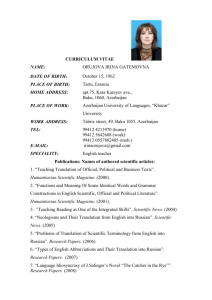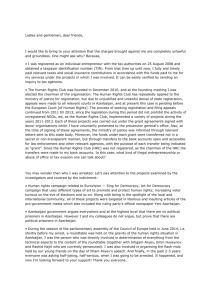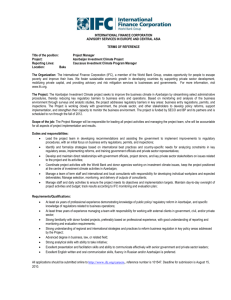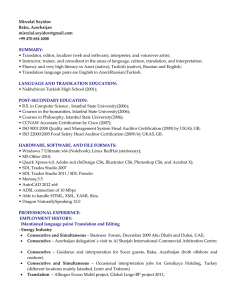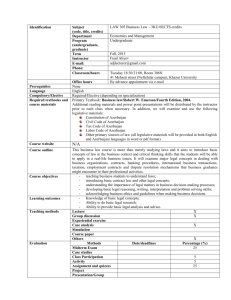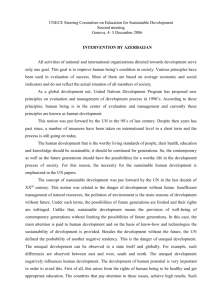RITSA - Project Overview
advertisement
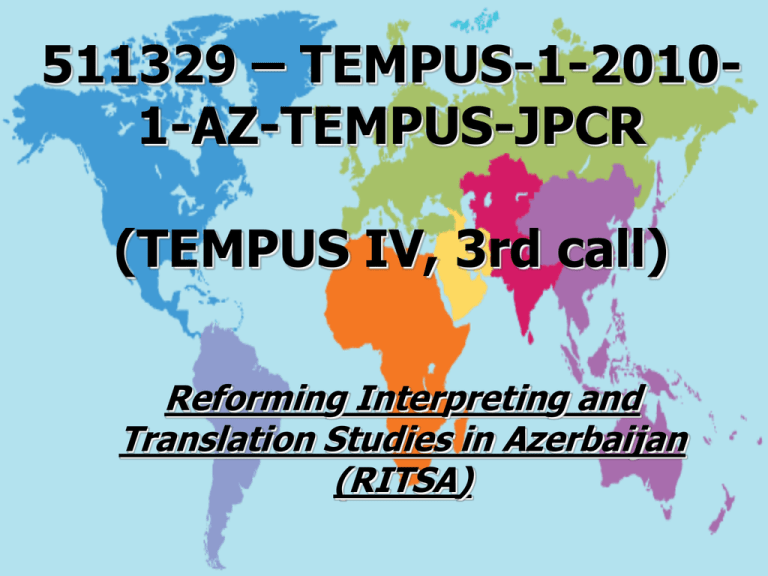
511329 TEMPUS-1-2010511329 – – TEMPUS-1-2010-1AZ-TEMPUS-JPCR 1-AZ-TEMPUS-JPCR (TEMPUS IV, 3-cü çağırış) (TEMPUS IV, 3rd call) Reforming Interpreting and Translation Studies in Azerbaijan (RITSA) Project Coordination ► Azerbaijan ► First University of Languages time coordination of a TEMPUS project in Azerbaijan Previous Projects SMHES T004A06 Designing Quality Assurance Systems in Azerbaijani Universities SMHES T021A06 State Accreditation and Licensing Agencies and Procedures in Azerbaijan Duration ► 15 October 2010 – 15 October 2013 36 months Funding 1, 076, 000 Euro Azerbaijan universities and organizations participating in the project ► Azerbaijan University of Languages (coordinator) ► Ministry of Education of the Azerbaijan Republic (associate partner) ► Nakhchivan State University ► Ganja State University ► Lankaran State University ► Baku In-service Teacher Training and Retraining Institute EU Universities ► University of Strasbourg/ITIRI (France) ► University of Leipzig (Germany) ► Scuole Civiche di Milano (Italy) ► University of Essex (Great Britain) Azerbaijan University of Languages(AUL) ► AUL offers bachelor, master and doctoral degrees in Foreign Languages, Linguistics, Literature, Interpreting and Translation, International Relations and Regional Studies. Ten languages are taught here through the above-mentioned study programs. AUL is the oldest institution for language teaching and teacher training in Azerbaijan and has developed national standards for language study programs at other institutions. Under the partnership with SOROS AUL established an Academic Reading and Writing Center for training language teachers. AUL has designed summer intensive Azerbaijani language program for US students under the US State Department funded National Security Language Initiative. In 2005 AUL- first in Azerbaijan, transferred to credit system. AUL is a member of Alliance of Universities for Democracy and European University Association. AUL maintains partnership relations with a number of Universities and education associations in EU, US, Middle East, Turkey, South Asia Role in the project AUL will coordinate the project and will have the main responsibility for its management. It will also have the central role in teacher-training and curriculum development. While the undergraduate curricula will be developed and implemented in all of the Azerbaijani partner Universities, the graduate curriculum will be implemented only AUL. So, in the future, BA graduates in Translation will be able to continue their studies at AUL. AUL will also be the main communication bridge between EU and local partners. It will coordinate the dissemination of the project outcomes through conferences, publications etc. Together with BITTRI, AUL will be the core institution where the language component of the curriculum will be designed and disseminated. The language center set up at AUL will be actively involved in dissemination also through the LLL component. Ministry of Education of the Republic of Azerbaijan (MoE) ► ► The Ministry of Education is a Central body which implements the state policy in the field of education and carries out overall methodical supervision. MoE collaborates with UNESCO, CoE, EU and significant number of higher education institutions of various countries such as USA, Canada, France, Great Britain, Germany, Austria, South Korea, Japan, Malaysia, Singapore, etc. MoE mission is to participate in formation and implementation of the state policy in the field of education, facilitate development of the education system in the Republic of Azerbaijan, ensure public monitoring and quality assurance in the field of education, ensure equal access to education with the view to protect the citizens' constitutional rights for education, provide scientific, academic and methodological supervision of all types of educational institutions, implement other functions commissioned by the legislation of the Republic of Azerbaijan. Role in the project The Ministry of Education of Azerbaijan Republic confirms its full support of and participation in the JEP RITSA to be coordinated by the AUL. The project has a comprehensive approach to curricular reforms in interpreting and translation which will facilitate Azerbaijan's international integration. Since the curricular reforms will envisage full compliance of the new courses with Bologna requirements, it will provide valuable framework for MoE. In the future this experience will be disseminated to other Universities of the country. One of the most important aspects of the project is the involvement of regional universities in Azerbaijan. They will gain valuable experience in curricular reforms in compliance with Bologna requirements and will act as focal points for further dissemination activities in their regions. MoE will ensure the implementation of the policy, provision of experts and other necessary support to facilitate the smooth running and sustainability of the project. Nakhchivan State University(NSU) ► ► NSU was established in 1967. It offers undergraduate, graduate and doctoral programs in specialties. English, French, German, Russian, Arabic and Persian are offered as majors. NSU has more than 4500 students and more than 300 academic staff members. Among them are 7 academicians, about 30 Doctors of Science, and 140 PhDs. NSU is one of the advanced institutions to implement the Bologna requirements. In 2007, NSU held a conference on “Azerbaijan’s Education in the Context of the Bologna Process”. NSU has close contacts with a number of international Universities such as Purdue Calumet University of the USA, Strasbourg University of France, the Cairo University, the Hilvan University and the Banu Suveyf University of Egypt, the Kocaeli University and the Kars Caucasus University of Turkey etc. NSU has worked with the European universities in the framework of TEMPUS projects. NUS has been taking serious steps to cerate an adequate infrastructure and develop resources. Role in the project. The role of NSU in the project is to contribute to the development of undergraduate and graduate study programs in translation and interpreting in Azerbaijan; to assist with the design of new types of syllabi and development of necessary study materials for the newly developed programs; to establish a LRC which will contribute to the staff development and training the trainers program in the filed of language teaching; to purchase necessary equipment and establish necessary teaching resources for the effective functioning and sustainability of the project; to provide institutional support for coordination of the project and for the organization and hosting of the events within the framework of the project; to implement the undergraduate curriculum during the lifetime of the project; to contribute to the dissemination of the good practice during the lifetime of the project as well as afterwards; to establish necessary sustainability and quality assurance procedures Ganja State University (GSU) Ganja State University (GSU) was established in1938. The University joined Bologna process in 2005. It has run projects within Erasmus Mundus programs. There are 3500 students, 16 doctors of sciences-professors, 170 PhDs, and 400 senior teachers in 37 education departments in GSU. The School of Foreign Languages, which was part of the School of Phonology before, started to function independently in 2000. Now 365 students are enrolled in this school in the following language study programs: English, Russian, French, and German. ► Role in the project The role of GSU in the project will be to participate in the development of undergraduate and graduate study programs in translation and interpreting in Azerbaijan and to contribute to the development of new courses; to establish a Language Resource Center for the purpose of staff development, production of study materials, and introduction of innovative language teaching methodology in foreign languages; to develop library resources and purchase necessary equipment; to provide institutional and logical support where necessary for the good coordination and management of the project; to implement the development adequate sustainability and quality assurance measures for the harmonious and integrated functioning of the project; to implement the updated undergraduate curriculum during the project's lifetime ; to contribute to the dissemination of good practice and development of life-long learning in AZ. ► Lankaran State University(LSU) Lankaran State University (LSU) functions as a State University from 1992. Language and translation studies program is offered within the school of Humanities and Pedagogical Sciences. Today about 1500 bachelors are trained on 22 specialties and nearly 100 masters study for their masters' degrees. More than 250 professors and teachers work at LSU, 120 of which are candidates of sciences – assistantprofessors and head teachers. The University has signed various multilateral agreement with different universities of the following countries such as Russia, Iran, Kazakhstan, Azerbaijan, Turkmenistan-the members of the Association of the Universities of the Caspian Sea Coastal Countries, including Strasbourg University of France named after Mark Block, Moscow University named after M.V.Lomonosov (Russian Federation), Ankara University (Turkey), Gilan University (Islamic Republic of Iran). Role in the project The role of LSU in the project is to engage in the development of undergraduate and graduate study programs in translation and interpreting in Azerbaijan; to contribute to course design and development of teaching materials; to establish Language Resource Center and equip it with necessary equipment; to provide necessary library resources for the effectiveness and sustainability of the project; to develop necessary measures and undertake all due activities for institutional support, quality control and sustainability of the project; to implement the undergraduate curriculum during the lifetime of the project; to involve in language teaching for school teachers within LLL framework; to take all necessary actions for the dissemination of the experience gained; to take necessary steps for good coordination and management of the project ► Baku In-service Teacher Training and Retraining Institute(BITTRI) ► Baku In-service Teacher-Training and Retraining Institute (BITTRI) was founded in 1939. BITTRI offers academic programs at the following levels: vocational training, advanced training and retraining of pedagogical staff in all educational establishments. The institute works out the new methods and forms of education, which satisfies to the world educational standards and governmental educational requirements. At present institute works on the project of distance education. BITTRI leads research activities in AZ in a field of pedagogy, social and technical sciences and language teacher-training. The institute possesses high quality staff and technical resources for research and training. BITTRI engages also in certification of pedagogical staff. In 1998, within the limits of the program of bilateral cooperation in the fields of cultural relations and science development between The Republic of France and Azerbaijan Republic, at BITTRI was established French studies center. ► Role in the project The role of BITTRI in the project is to help partner Universities in developing teacher training courses for language teachers within the framework of lifelong education; to help partner Universities in the design of teacher- training for language teachers; to conduct teacher training courses for language teachers at four partner Universities in Azerbaijan; to conduct distance teacher trainings for language teachers; to establish a Language Resource Center for the purpose of staff development, production of study materials, and introduction of innovative language teaching methodology in foreign languages University of Strasbourg /ITIRI (France) ► ► ITIRI is an institute of UdS (which currently has around 45,000 students), as is part of the Faculty of Applied Languages and Humanities. It offers professional Master’s Degrees in the following fields: Translation, Interpreting, International Relations, European Studies, Communication and Economic Intelligence. 250 students are registered at the institute, with 50% coming from abroad and representing over 20 different nationalities. The teaching staff is largely made up of professionals (around 120 part-time lecturers) and the institute works in close cooperation with several external partners, such as national and European institutions, local and regional authorities and companies. Beyond it’s mission as a teaching institute, ITIRI has played an active role in a number of international cooperation projects including inter-university cooperation (joint diplomas, out-sourced diplomas). Role in the project ITIRI will undertake the following activities: active involvement in the development of advanced curricula in translation and interpreting and its adjustment to ECTS requirements; organization of teacher trainings in EU and Azerbaijan for conference interpreting teachers; course design and development of teaching materials for the study programs; course design and development of study materials for life-long education programs for conference interpreters; equipment of the conference interpretation laboratory as envisioned under the project; assisting the partner universities to develop quality assurance procedures; helping the partner Universities with dissemination activities (development of dissemination materials, creation of a web-page and organization of the dissemination conference); contributing to the good coordination and management of the project University of Leipzig (Germany) (UoL) ► Leipzig University was founded at the beginning of the 15th century. Today there are 14 faculties and 150 institutions within the University. With more than 25.000 students Universität Leipzig is Saxony's second largest university. The university offers 190 study programs leading to Bachelor's degrees, Master's degrees, Staatsexamen, Diplom and Ph.D.s of which nearly all are tuition-free. The university offers a number of courses in English and other foreign languages and there are several programs allowing foreign students to study abroad at the university. Current exchange partner universities include University of Arizona, University of Houston, University of Alberta, and University of Edinburgh among others. The institute of applied linguistics and Translatologie (IALT) offers as a part of the philological faculty of the University of Leipzig the courses of studies "Bachelor Translation" as well as "master of conference interpretation" as well as "Master Translatologie". ► Role in the project The responsibilities of UoL in the project will be to contribute to the updating of the undergraduate and graduate curricula in translation and interpreting studies, in particular by providing consultations on course design, development of teaching materials and introduction of new teaching methodology; to contribute to the training of the staff from the partner institutions in EU and Azerbaijan; to contribute to the development of teacher - trainings and trainings for translators and interpreters in the framework life-long education; to help Azerbaijan University of Languages with development of learning resources; to contribute to the dissemination activities undertaken by partner Universities; to cooperate with the consortium members on the management and coordination issues and to ensure full institutional support to the project; UoL will host a study tour for QPLN team Scuole Civiche di Milano (Italy) (SCM) ► Fondazione Scuole Civiche di Milano was born from the union of four schools, formerly managed by the City of Milan: The Scuola Superiore per Mediatori Linguistici (SSML) has been certified by the Italian Ministry for University and Research and authorised to award a degree equivalent to the degree in Language Mediation awarded by Italian universities. The Istituto Superiore per Interpreti e Traduttori (ISIT) awards joint Master’s Degrees in Conference Interpreting and in Translation in conjunction with the Marc Bloch University of Strasburg, France. The Language Department of Fondazione Scuole Civiche di Milano provides a unique opportunity for students to attend a three-year course in Language Mediation, which is fully recognized and accredited by the Italian university system. ► Role in the project The role of SCM in the project will be to assist the Universities in Azerbaijan in the design of courses for undergraduate and graduate study programs in translation and interpreting; to organize seminars and trainings for language as well as translation teachers in the University of Milan; to contribute to the organization and holding of local teacher trainings; to assist the partner Universities with the establishment Language Resource Centers; to help partner Universities with the development of library and teaching resources; to contribute to the development of quality assurance procedures for the newly developed study programs; to cooperate with the consortium members for coordination and management purposes. SCM will host a study tour for LLL trainers. University of Essex(UoE) ► The University of Essex is a top ten ranking university for teaching quality and research. It has a student population of 8500 and is the UK’s most internationally diverse campus university, with a genuine long standing commitment to internationalization and global engagement. The International Academy, an academic department, at the University of Essex presently has 500 students, and 84 academic and teaching staff who are highly qualified and experienced as language teachers. The focus is on what students need, and with one of the largest international student and staff populations in the UK, we are able to offer a range of pre-undergraduate, undergraduate degrees, postgraduate and teacher training courses in language and linguistics. With the experience and expertise of our staff, we are able to train language teachers as well as develop and customize language courses for students both at undergraduate and postgraduate levels. ► Role in the project UoE will work with AUL and three partner Universities as well as Baku In-service Teacher Training and Re-training Institute in Azerbaijan within the framework of this project. In particular, the IA (International Academy) within the University will assist these institutions in the specification of a syllabus for a language teaching methodology course with learning outcomes; with the selection and introduction of appropriate materials for these courses; in the establishing and equipping of their LRC by providing a list of appropriate resources to support the course that the IA is helping the partner institutions to develop; in the development of QA processes for the course that the IA is helping the partner institutions to develop. UoE will provide a teacher training course for language teachers at the institutions in Azerbaijan. The training course can be delivered by a combination of direct teaching at the UoE; virtual teaching from the UoE to the partner institutions. Development of Partnership ► University of Strasbourg – more than 10 years of collaboration in teaching French as a Foreign Language ► University of Strasbourg/ITIRI – several years of collaboration in training translation teachers ► University of Essex – a Dual Degree program in teaching English as a Secondary Language Important: Utilizing the potential of existing partnerships makes the submission procedures easier and less problematic Developing New Partnerships outside TEMPUS ►A new post-Tempus agreement with Civic School of Milan ► Support from the Partnership with Hacettepe University in Ankara Note: Extra potential helps boost TEMPUS activities Activity Fields 1. Capacity building in the language and translation study field (training of teachers and teacher trainers) 2. Establishing/improving and implementing of the study programs in translation and interpreting 3. Setting-up infrastructure 4. Establishing a framework for the life-long education program 5. Implementation of Quality Assurance Plans 6. Dissemination of the experience gained 7. Ensuring sound Management of the project Capacity Building in the fields of translation study ► ► ► 1. Train-the-trainer: a) Language (UoE); b) Translation (undergraduate (UoL, SCM); c) Conference Interpreting (UdS/ITIRI) 2. Teacher-Training: a) Language (UoE); b) Translation (undergraduate (UoL, SCM); c) Conference Interpreting (UdS/ITIRI) 3.Trainings of the administrative staff (UdS; UoE) Topics: Quality issues, student surveys, project administration, departmental management and administration Trainings: Quantitative Indices 18 teacher trainers (10- LAN, 6-TR, 2 -CI) and 46 teachers (18-LAN, 18-TR, 10-CI) trained in EU Appr. 151 LAN teachers, 184 TR teachers and 30 CI trained in AZ 12 ADM staff trained in EU 24 QA staff in EU Total trained capacity: Appr. 465 Training of Teacher Trainers ► Language trainings- total 10 flows (in undergraduate level) AUL -2 persons NSU -2 persons LSU -2 persons BITTRI-2 persons GSU -2 persons ► Undergraduate Translation program- total 6 flows AUL-6 persons ► Conference interpretation for graduate program- total 2 flows AUL-2 persons Teacher Trainings ► Language trainings - 142 flows AUL(38) NSU(26) GSU(34) LSU(24) BITTRI (16) TH (4) ► Undergraduate Translation program - 167 flows AUL-(91) NSU-(34) LSU-(19) GSU-(19) TH-(4) ► Conference interpretation for graduate program – 20 flows AUL-20 persons Administrative Trainings 1. Trainings of administration representatives of Azerbaijan universities in EU universities (12 flows) Training in Strasbourg university a) b) c) d) e) f) NSU(1) LSU(1) GSU(1) AUL(1) TH(1) BITTRI (1) Training in Essex university b) NSU(1) c) LSU(1) d) GSU(1) e) AUL(1) f) TH(1) g) BITTRI(1) Total: 6 Total: 6 Establishing/improving and implementing of the study programs ► 1. Restructuring the language component ► 2. Revising/Implementing of the translation programs ► 3. Establishing of new graduate study programs in conference interpretation ► 4. Dissemination of programs among the partner Universities of Azerbaijan A new approach to curriculum design; boosting Bologna principles Number of Students Benefiting from the Project during its Lifetime ► 230 undergraduate students (from all partner Universities (140 from AUL only) ► 20 – graduate students Years 2 and 3 Establishing Proper İnfrastructure ► 1. Establishing language resource centers ► 2. Establishing conference interpreting network ► 3. Equipping LRCs ► 4. Establishing learning resources (textbooks, study materials, etc.) Implementation of Quality Assurance Plans 1. Study Tour in EU (24 flows to UoE, SCM, UoL, UdS/ITIRI) 2. Development of internal evaluation procedures 3. Implementing of internal evaluation Staff performance appraisal Evaluation of the study program Student Surveys 4. Accreditation of the undergraduate program Azerbaijan authorities 5. Joint Degree with UdS/ITIRI 6. Publication of outcomes of external and internal evaluation LLE component ► Trainings for ► Trainings for ► Trainings for specialists ► Trainings for the secondary school teachers the translation specialists the conference interpretation socially disadvantaged groups Dissemination of the experience gained ► Initial Information Conference ► Web Page ► Dissemination Materials ► Round tables at the Ministry of Education ► Final Conference Project Management ► Coordination Meetings ► Reporting ► On-going coordination The Role of the Project in the Educational Reforms 1. Structural changes in the curriculum design a) Number of study hours b) Transfer to the language teaching in the 1st course programs completely 2. Academic Management Skills 3. Quality Assurance through Internal and External Review (Accreditation by the Ministry; Joint Degree with a EU partner) 4. Defining Learning Outcomes; Facilitating Reforms in NQF Tips for Applicants (1) ► Understand your needs first ► If you can clearly state our need, it will be much easier to illustrate the steps you are going to take in project implementation ► Choose your partners carefully; assess their potential realistically (weakness of partners will reflect in project evaluation but also in further project implementation) ► Remember that it takes time to convince solid potential partners to join the project proposal Tips for Applicants (2) ► Involve extra people in your team for project writing (and further implementation) for the sake of sustainability ► Start in time and work steadily: some projects need more than a year to develop ► Do not be afraid of assessing risks and assumptions fairly ► Develop a good LFM first Tips for Applicants (3) ► Do not leave administrative documents (especially those to be signed by high authorities) to be completed at the end. Authorities may not be available at the planned time. ► Consider risks with timely postal deliveries ► Submission on the last day increases the risk of failure. Consider communication risks etc. Tips for Applicants (4) ► If your project is not awarded in the first year, continue submitting until you get it. Persistence helps improve your project ► Do not be afraid of upward initiatives. Initiatives that seem impossible due to administrative or legislative impediments, will be supported if properly justified. Do not forget that in many areas statutory legislation is in the process of reform and decision-makers often need sound feedback. THANK YOU! TƏŞƏKKÜR EDİRİK!
